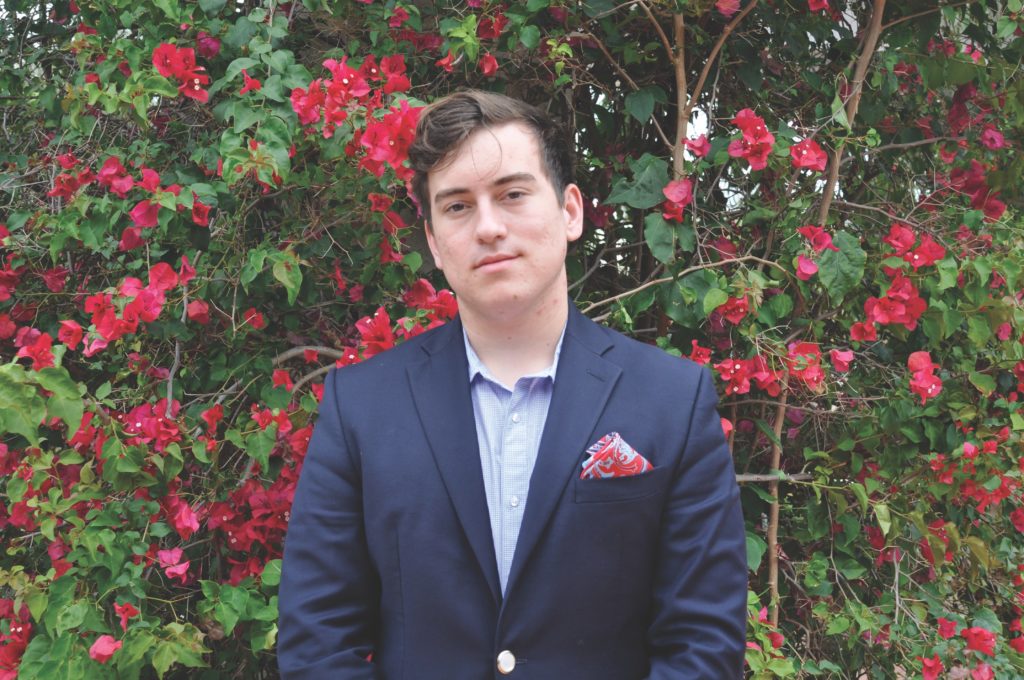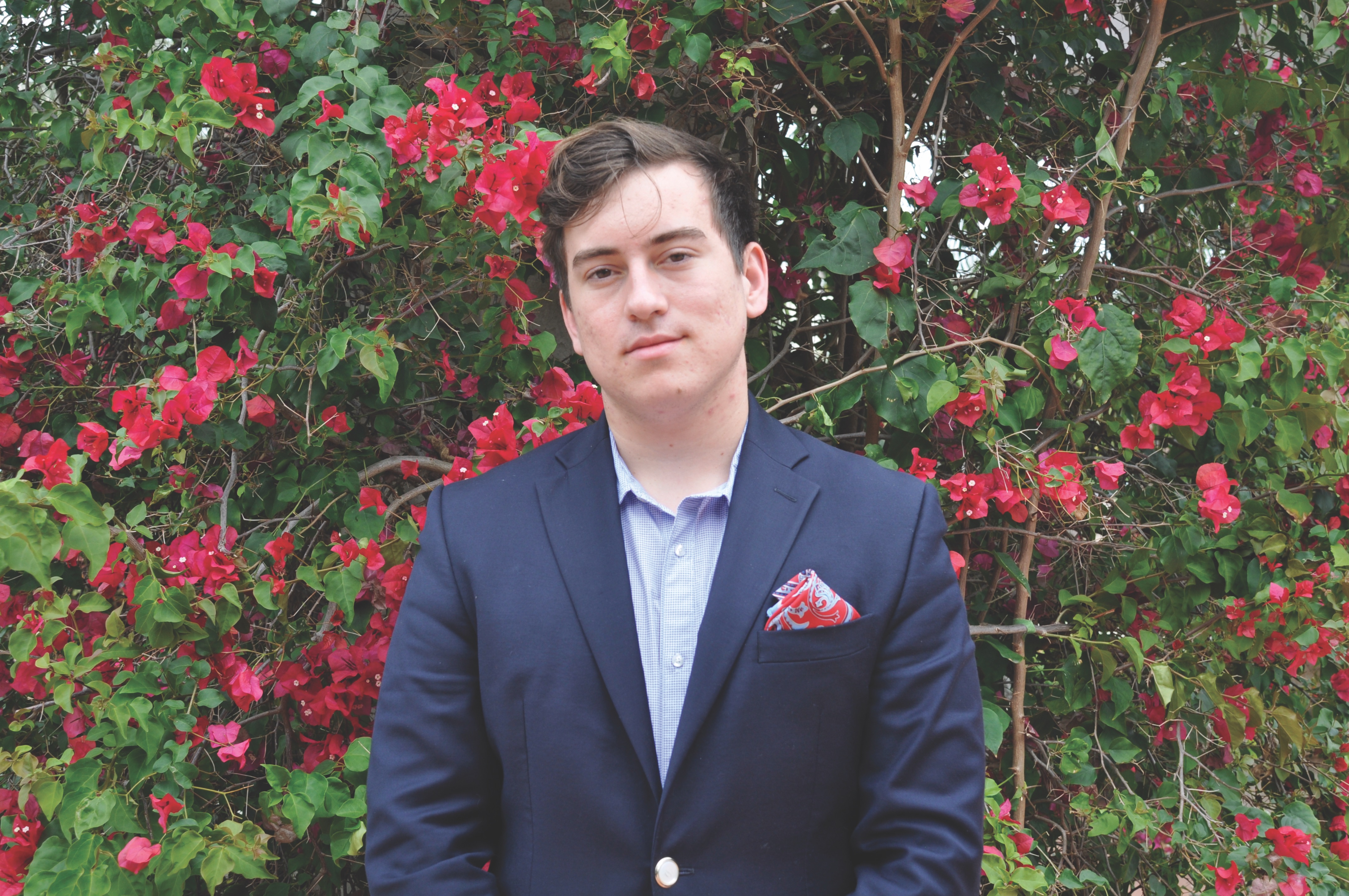
By Crow’s Nest Staff
A former Student Government leader who was kicked out of school in May 2017 for allegedly assaulting a female student in his dorm room has gotten the expulsion removed from his record.
Instead, the USF St. Petersburg record of Samuel Goetz will show that he was suspended, effective December 2017, with what the university calls “an ongoing restriction from access to the University” thereafter.
The change from expulsion to suspension, hammered out in negotiations between attorneys for Goetz and the university, is a victory for Goetz.
He was elected vice president of Student Government two months before his expulsion, but he has maintained in legal documents that he did not want to return to the university. He just wanted to remove the blot of expulsion from his record.
“Although I am not looking to ever re-enroll at USF, an expulsion will effectively end my journey anywhere else,” he said. “I will lose all opportunities to obtain a good education as well as to pursue my dream of going to law school.”
According to social media, Goetz is now apparently attending community college and working for an accounting firm in Tallahassee. He declined to comment to The Crow’s Nest.
His attorney, Mark O’Brien, did not respond to several messages from the newspaper.
The turnaround in the Goetz case began in December, when three Pinellas County circuit judges ruled that Goetz’s rights of due process were denied by both the university’s student conduct board and Dean of Students Jacob Diaz.
Reversing their own June 12, 2018, ruling, the judges said the board and the dean relied on a summary of an investigative report – “the only document on which USF relied in presenting its case” – in making their decisions.
That meant, the judges wrote, that some evidence and testimony that went into the investigative report was not made available to Goetz, whose “due process rights were violated by the nondisclosure of information that either directly or materially affected what was actually presented at the hearing.”
The judges ordered a rehearing.
University spokeswoman Carrie O’Brion declined to discuss the case, noting that the university “may not disclose the specific details of this student matter as the records and information are confidential and exempt from disclosure.”
However, she confirmed in a statement that “the University complied with the court order that requested the matter be reopened. With full participation of all parties, the University imposed the voluntary and mutually agreed upon resolution, which did include a suspension effective December 2017 with an ongoing restriction from access to the university.”
Rightly accused or railroaded?
A month after he was expelled in May 2017, Goetz filed the lawsuit, contending that the charges were false and he was denied due process in contesting them.
According to documents in his lawsuit, the sexual incident happened during the evening of Sept. 28, 2016, and the early morning of Sept. 29.
The woman encountered Goetz in the dorm room of two of her friends, then later accepted his invitation to come to his room to “cuddle.”
They began kissing, according to the documents, and – at his urging over the course of several hours – she consented to digital penetration. She also asked him to put on a condom.
At that point, documents show, their accounts differ.
Goetz says he did not “force or coerce her to engage in sexual intercourse … Every moment of my encounter with (her) was consensual. When she expressed that she was uncomfortable with anything that we were doing, I immediately stopped.”
She denies that. She says she repeatedly told him no and he persisted. At one point, he pressed her body against a wall.
A few hours after the encounter in his dorm room, Goetz says, the woman invited him to breakfast. After breakfast with two others, he says, they went to the bookstore together.
Later that day, he says, the woman asked him for a date, which he declined. It was only after she learned from social media that he had gone out with somebody else that she filed the complaint, he says.
On Oct. 5, six days after the encounter, the woman called the university’s anonymous hotline to report an assault.
On Nov. 16, she filed a formal complaint under Title IX, the federal law that prohibits sexual discrimination, harassment and violence. She said the sexual interactions “went further than she anticipated or gave consent to.”
She did not file criminal charges.
When Goetz was advised of the complaint, documents show, he was ordered to have no contact with the woman, but he was not suspended.
He hired a lawyer and provided a written statement denying the allegations on Jan. 4, 2017.
While the case was developing, Goetz continued attending class and serving as a student senator. He was elected vice president of Student Government on March 2.
Just seven weeks later, he suddenly resigned – a move that caught SG by surprise and forced President-elect David Thompson to name a new vice president-elect.
After a hearing on May 3, the university’s student conduct board – a panel of students and faculty members – found Goetz guilty of “non-consensual sexual contact.”
Diaz, the dean of students, accepted the board’s findings and expelled Goetz on May 10, then denied his appeal three weeks later.
In pleading his case with university officials and in his lawsuit, Goetz contended he was railroaded.
He said that he was denied due process throughout the university’s investigation and that the university “failed to meet the burden of proof of providing competent substantial evidence.”
He was not allowed to see the text message evidence submitted by the woman or the statement of allegations she made against him, his suit says.
He also was denied the opportunity to cross-examine her because she was permitted to submit written testimony rather than appearing at the conduct board hearing.
Moreover, the suit argues, if the university “really felt the petitioner (Goetz) was such a threat that expulsion was the necessary remedy, why did they wait nearly an entire school year to impose the sanctions?”
At first, three Pinellas County circuit judges sided with the university, ruling on June 12, 2018, that Dean Diaz’s decision upholding the finding of the conduct board did not violate Goetz’s due process rights, “complied with the essential requirements of law,” and “was supported by competent, substantial evidence.”
But when Goetz appealed, the same three judges on Dec. 21, 2018, withdrew that finding and said Goetz deserved a new hearing.
A national debate
The Goetz case comes at a time of considerable national debate on sexual conduct on college campuses and the rights of students accused of assault.
Under the administration of President Barack Obama, the U.S. Department of Education warned that campus sexual assaults had become a major problem. It directed school officials to crack down on alleged offenders or risk losing some federal funds.
But critics of the Obama approach said that meant universities were playing cop, prosecutor, judge and jury in sexual assault cases – a process that sometimes trampled on the rights of the accused.
In recent months, cases in both state and federal courts around the country have tilted the other way, giving the accused broader rights.
Goetz’s attorneys cited one of those cases – at Claremont McKenna College in California – in persuading the judges to order a campus board rehearing for their client.
Meanwhile, Betsy DeVos, the education secretary for President Donald Trump, has issued a proposed rewrite of the rules governing campus sexual misconduct.
Her proposed rules, released in November, would give the accused more rights and narrow the cases that schools must investigate.
Women’s rights groups contend those changes would make college campuses less safe for women, but others argue they restore balance in a process that is skewed too far in favor of accusers.
Student governments at some colleges and universities around the country have responded to DeVos’ proposals with resolutions opposing the changes.
One of them is the Student Government general assembly at USF St. Petersburg. On April 1, it approved a resolution by senator Naya Payne and nine other senators opposing the DeVos proposal.
The Department of Education has received more than 96,000 comments about the proposed changes and must review them before issuing final rules, according to INSIDE HIGHER ED, an online publication that covers colleges and universities.
Compiled from reports by Tim Fanning, Jonah Hinebaugh and Anna Bryson.




This is a huge source of trauma for the woman which this assault happened to and your paper has written about it with favorable words for the assailent about 6 times now. It’s been over 2 years and she still has to read about her own rape in the paper. Please have some humanity and stop this.
God this guy is so pathetic. What a loser. It’s only a matter of time until his issues with self-esteem and his frail ego yield more hurt and suffering. For his sake, I hope he has come, or will come, back down to earth, & finds the help & guidance he so blatantly needs. The world doesn’t need anymore sociopaths
I agree with Erin… it really seems as though your paper is favoring someone who has inflicted serious pain and trauma on an innocent woman. Furthermore, Title IX investigations and Student Conduct operate on a system of preponderance of the evidence. They don’t need to have the data to support a decision beyond reasonable doubt like the justice system. If he is so upset about the way he was found guilty, maybe he should understand Student Conduct and Title IX better.